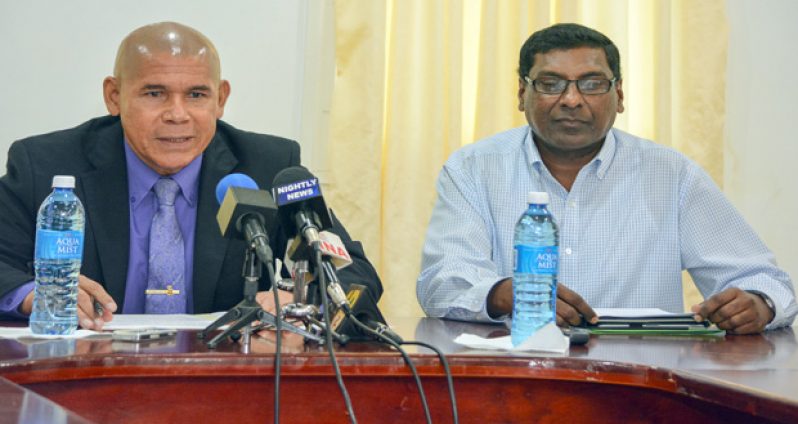By Svetlana Marshall
– More than 5,000 treated mosquito nets distributed
A 16-YEAR-OLD schoolboy has tested positive for the Zika virus, but is now back in school after receiving treatment, health officials said on Monday, as they pointed to steps being taken to avoid the spread of the virus.The boy, who resides at Eccles, East Bank Demerara, was checked into hospital after developing fever, rashes about his body, and conjunctivitis, which is commonly known as red-eyes. He has since recovered from the virus, and is attending school as per norm after being treated.

“The person has no history of any travel outside of Guyana; however, he did visit one of the hinterland regions more than a month prior to the occurrence of the symptoms,” Dr Shamdeo Persaud, Chief Medical Officer said.
This schoolboy becomes the second person to be infected with the virus after a 27-year-old woman tested positive last month.
Guyana tests for Zika at the Caribbean Public Health Agency (CARPHA) in Trinidad. The results from the last batch of samples were returned last Friday. It is from those results that the case of the schoolboy was noted.
A number of health workers have visited the boy’s home in order to conduct interviews with the four members of his household.
“We are in the process of sampling and testing those persons to see any possible occurrence,” Dr Persaud told reporters. “We have been able to track all of his movements, attendance to lessons and so on, (and) we are following up with those sites to ensure that sufficient vector control measures are in place.”
There were, of recent, 88 suspected cases of the virus, but the Health Ministry sent only 55 blood samples to CARPHA for testing. Samples were taken from both public and private health institutions from all of Guyana’s 10 administrative regions, with the majority taken from Regions 2, 3, 4, 5 and 6.
“We had 88 persons who fell into the classification, of course you know for testing. CARPHA recommends a serial testing where such persons check for dengue and chikungunya, and if those are negative, then those samples are sent off to CARPHA and the test for Zika is done. So far, 55 results were made available; and of those, two are now positive,” the CMO further explained.
The 27-year-old woman, who was the first Guyanese resident to be confirmed as having Zika, resides at Rose Hall Town, Corentyne and at Covent Garden, East Bank Demerara.
With both confirmed cases having been detected along the East Bank of Demerara, the Public Health Ministry has taken a decision to intensify vector control activities along that corridor.
“Fogging exercises continue, especially in areas where there are high mosquito index,” Dr. Persaud posited. In addition to the fogging exercise, premises are being inspected for breeding grounds, and insecticide-treated bed nets are being distributed at local health centres.
The Public Health Ministry has also distributed approximately 5,000 insecticide-treated bed nets for pregnant mothers across the country, and is in the process of educating the public on precautionary measures to be taken to avoid contracting the virus.
Though the symptoms appear minute, the Zika virus can result in life-threatening defects. In Brazil, the Zika fever has been linked to a spike in cases of micro-encephalitis, an inflammation of the brain contracted in the first months of pregnancy. In fact, thousands of babies in Brazil have been born with abnormally small heads.
“We know that the Brazilian situation continues to be very volatile. We have some invalidated reports that in Boa Vista there might be some additional cases, and so we have contacted the health authorities there over the weekend, and they have been continuously fogging and monitoring the situation,” the CMO explained.
On Saturday, the BBC reported that “more than 200,000 soldiers have been deployed across Brazil to warn people about the risks of the Zika virus.”
The troops are reportedly going from door to door, handing out millions of leaflets that advise people about the risks of this mosquito-borne virus.
Brazil has 462 confirmed cases of microcephaly, and is investigating another 3,852 suspected cases.
The Zika virus was first isolated in 1947 in the Zika Forest of Uganda, in a Rhesus monkey during the transmission of wild yellow fever. The virus was first isolated in humans in 1952 in Uganda and Tanzania. In 1968, the virus was detected in human samples in Nigeria. In 2007, the first major outbreak of Zika virus fever occurred on the island of Yap in Micronesia, where 185 suspected cases were reported. In October 2013, approximately 10,000 cases were registered in an outbreak in French Polynesia.
Brazil confirmed its first case of Zika in May, 2015.
Recent outbreaks of the Zika Virus in different regions of the world demonstrate the potential of the spread and outbreak of this arbovirus in regions where the Aedes Aegypti mosquitoes are present.



.jpg)









